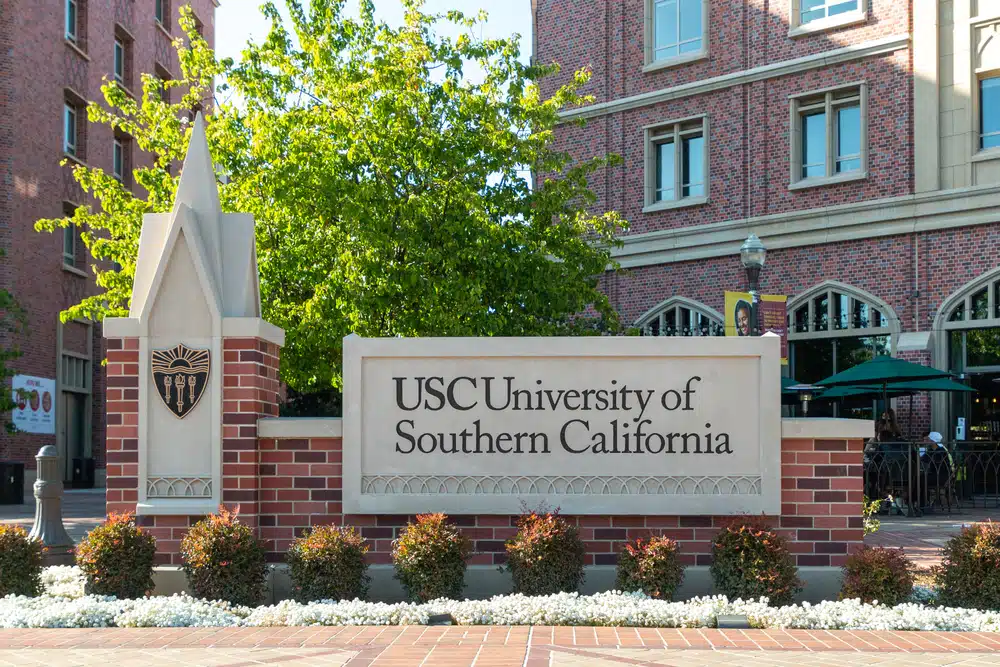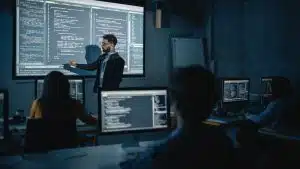A Glance at USC Computer Science Program
The University of Southern California (USC), located in the heart of Los Angeles, is considered by many to be one of the world’s leading private research universities. Among its diverse academic departments, the USC Computer Science Department within the Viterbi School of Engineering stands as a beacon of innovation, fostering a dynamic environment that thrives on exploring the ever-evolving world of technology.
From shaping how businesses operate and making critical breakthroughs in healthcare to propelling scientific research and influencing how we communicate, computer science has become a foundational pillar in almost every industry and sector of society. This broad impact is reflected in USC’s Computer Science Department, which has shown continuous growth and innovation since its inception.
The department’s history traces back to 1968, when it was established as an independent discipline, transitioning from its roots in Electrical Engineering. Since then, it has grown exponentially, building a solid legacy of teaching, research, and innovation excellence. It has consistently been spearheading technological advancements, always adapting its curriculum and research programs to stay abreast of and contribute to the latest developments in the field.
USC Computer Science Programs
Undergraduate Programs
The department offers various enriching undergraduate USC Computer Science Programs to suit different interests and career aspirations. The Bachelor of Science in Computer Science is a comprehensive program that equips students with a solid foundation in algorithms, data structures, software design, and computing systems, preparing them for diverse roles in the tech industry or further academic pursuits.
For those interested in hardware-software integration, the Bachelor of Science in Computer Engineering and Computer Science combines electrical engineering principles with computer science, teaching students to design and build computer hardware and software. The Bachelor of Science in Computer Science (Games) is an interdisciplinary program combining computer science with game design, aimed at students looking to break into the dynamic video game industry.
In addition to these major programs, USC offers a range of special programs and minors, such as Computer and Digital Forensics, Computer Science (App Development), and others, allowing students to tailor their education to their unique interests and career goals.
Graduate Programs
The USC Computer Science Department’s graduate programs offer opportunities for deep specialization and advanced research. The Master of Science in Computer Science provides a thorough grounding in advanced concepts, including AI, systems and networks, and databases. It allows students to develop a high degree of expertise in their chosen area.
For students that are interested in the rapidly growing field of data science, the Master of Science in Computer Science (Data Science) is designed to equip students with advanced knowledge and practical skills in data management, data mining, machine learning, and big data processing. The Master of Science in Computer Science (Game Development) caters to those aiming to innovate in video games and interactive media, offering advanced coursework in game design, artistry, and engineering.
Finally, the Doctor of Philosophy in Computer Science is a rigorous research-oriented program, ideal for those seeking to contribute new knowledge to the field, with opportunities to work with and collaborate with faculty on cutting-edge research, ranging from AI and machine learning to cyber-physical systems and quantum computing.
USC CS Curriculum
Core computer science curriculum
USC’s core computer science curriculum is carefully designed to give computer science students a thorough understanding of the key concepts and principles that form the backbone of the field. This includes courses in:
- Algorithms: where students learn about efficient problem-solving methods
- Data structures: where they learn about the organization and storage of data
- Computer organization and systems: where students are introduced to the underlying architecture of computers and how they operate
- Software development: where they learn to design, implement, and test software applications.
Furthermore, students explore the principles of operating systems, networks, and databases, learning how to manage and manipulate data effectively. Beyond these technical aspects, the curriculum also covers theoretical computer science, giving students a deeper understanding of computation and problem-solving.
The curriculum is balanced with courses in mathematics and the sciences, along with courses emphasizing written and oral communication skills, preparing students to succeed as technical experts and as effective communicators and team players in diverse professional environments.
Specialization tracks
In addition to the core computer science curriculum, USC offers a variety of specialization tracks, allowing students to focus their studies based on their specific areas of interest within the broad field of computer science.
These tracks offer more focused study and coursework in emerging and high-demand areas such as Data Science, Artificial Intelligence, Cybersecurity, Software Engineering, Game Development, and more. The Data Science track, for example, focuses on data management, data mining, machine learning, and data visualization, preparing students for roles in the rapidly expanding field of big data.
The Artificial Intelligence track delves into areas like machine learning, robotics, and natural language processing. The Cybersecurity track emphasizes information security, cryptography, and network security. In the Software Engineering track, students learn advanced software design, development, and maintenance concepts.
The Game Development track, on the other hand, combines elements of computer science, design, and storytelling to train students for careers in the game industry. These specialization tracks enable students to tailor their education to their career aspirations, offering a more personalized and relevant educational experience.
Interdisciplinary opportunities
USC’s Computer Science program is not confined to its domain but is deeply integrated with numerous other disciplines, offering students a wide range of interdisciplinary opportunities. Students can engage with other fields, such as biology, in areas like bioinformatics and computational biology; physics, in quantum computing; business, in areas like e-commerce and technology management; and the arts, in interactive media and game design.
This interdisciplinary approach is particularly emphasized in Data Science and Artificial Intelligence, where applications span many sectors like healthcare, finance, and environmental science. Such opportunities enable students to apply computer science principles in various contexts, fostering innovation and problem-solving in a broader societal framework.
This approach not only equips students with a versatile skill set but also helps them understand technological development’s societal implications and responsibilities.
USC Computer Science Faculty and Research
Overview of faculty
The USC Computer Science Department faculty comprises a diverse group of internationally recognized scholars who are leaders in their respective fields. They bring experience, expertise, and innovative research to the classroom, offering students a rigorous and inspiring learning environment.
The faculty includes pioneers in artificial intelligence, data science, cybersecurity, software engineering, quantum computing, and more. They guide students to fully develop their potential in and out of the classroom.
Many faculty members have been recognized with prestigious awards for their contributions to the field of computer science, and their research frequently appears in top-tier academic journals and conferences. This exceptional faculty body is a cornerstone of USC’s Computer Science Department, driving its reputation as a leading institution.
Notable faculty achievements
The faculty of USC’s Computer Science Department have made notable contributions to the field of computer science and have received numerous accolades in recognition of their work. Some faculty have been elected as fellows of prestigious societies like the Association for Computing Machinery (ACM), the Institute of Electrical and Electronics Engineers (IEEE), and the American Association for Artificial Intelligence (AAAI).
They have won awards such as the NSF CAREER Award, a highly competitive grant for early-career researchers. Their research has been featured in top-tier academic journals and at leading conferences, and some faculty have played key roles in developing important technologies or methodologies in their field.
In addition to their research contributions, many faculty have also been recognized for their excellence in teaching and mentoring, earning awards from USC and other organizations for their dedication to student success. These notable faculty achievements are a testament to the high caliber of the department’s academic and research pursuits.
Research areas and facilities
The USC Computer Science Department fosters a vibrant research environment, facilitating groundbreaking work in various areas. These areas include Artificial Intelligence, where faculty and students are exploring topics such as machine learning, robotics, and natural language processing; Data Science, focusing on big data, data mining, and data visualization; Cybersecurity, emphasizing areas like network security and cryptography; and Software Engineering, where research is conducted on software design, development, and testing methodologies.
Other areas include Human-Computer Interaction, Quantum Computing, Bioinformatics, and more. To support this breadth of research, the department boasts state-of-the-art facilities, including advanced computing labs, robotics labs, and a dedicated Computer Science (Games) program game development lab. These facilities enable faculty and students to conduct research, collaborate, and make meaningful contributions to the field.
Student involvement in research
USC strongly emphasizes student involvement in research, believing that hands-on research experience is a vital component of a comprehensive computer science education. Undergraduates can participate in research projects under the guidance of faculty, either through independent study courses or formal research programs.
Some may even co-author research papers and present their work at academic conferences. Graduate students, particularly those in the Ph.D. program, are deeply involved in research, often working closely with faculty on cutting-edge projects, contributing to published work, and presenting their findings at national and international forums.
This involvement in research allows students to apply what they’ve learned in the classroom to real-world problems, provides them with a deeper understanding of their area of interest, and prepares them for future academic or industry research roles.
Now that you have an idea about USC, your college admissions should be where you pay attention next. To ensure that you get into the college you want, you can get help with AdmissionSight. With ten years of experience with college admission experts, AdmissionSight can help you get into the college of your choice. You can talk to our experts today to get an initial consultation.








































